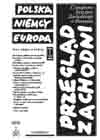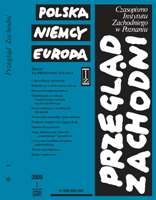
The Problem of Ensuring Germany’s Energy Security in the Context of Gradual Resignation from the Exploitation of Nuclear Power Plants
Problem zapewnienia bezpieczeństwa energetycznego Niemiec w kontekście stopniowej rezygnacji z użytkowania elektrowni jądrowych
The article presents selected problems pertaining to Germany’s energy security in the context of the country’s resignation from the exploitation of nuclear power plants. The following issues are discussed: power mix structure, degree of dependence on the import of energy resources and diversification of directions of supplies. The causes and essence of the change of decision concerning the use of nuclear power in Germany following the failure of nuclear reactors in Japan in March 2011 are also analyzed.
More...
